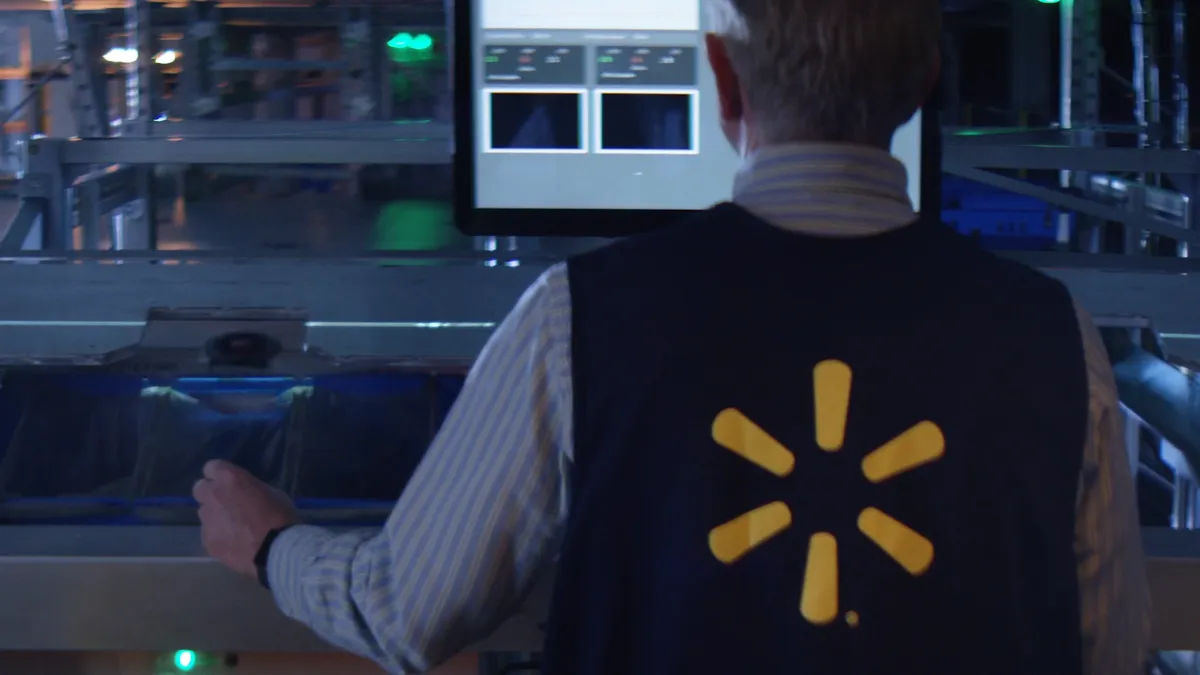Dive Brief:
- Walmart announced it's testing a robotics system that will gather customer’s online orders at the store level. The Alphabot, a robot built specially for Walmart by Alert Innovation, will collect products, then deliver them to employees, who will assemble orders and give them to customers picking up at the store.
- The pilot will launch at the end of this year at a single store — a supercenter in Salem, New Hampshire. The Alphabot will operate in a dedicated 20,000-square-foot add-on to the newly remodeled store, which will also include drive-thru pickup lanes for shoppers.
- In a blog post, Mark Ibbotson, Walmart’s president of central operations, wrote that Alphabot will collect most grocery items, “though our personal shoppers will still handpick produce and other fresh items.”
Dive Insight:
This may just be a test for Walmart, but automated fulfillment is shaping up to be a key strategy in tackling the online grocery challenge.
As e-commerce orders grow and more consumers demand speedy service, supermarkets will face pressure to be as efficient as possible. Using workers to pick and pack orders in stores — the model most grocers follow currently — is the easiest way to meet demand, but using robots to pick and even pack orders promises to be faster, cheaper and more precise over the long run.
Kroger’s investment in Ocado, which was announced back in May and includes building up to 20 automated warehouses across the country, is the biggest testimony to this so far. While these facilities are expensive and time-consuming — taking two to three years to build and costing around $400 million, brokerage firm Bernstein estimates — they promise to save money, support market expansion and help the retailer reach areas of the country where it doesn't have a strong store presence.
What's different about Walmart's pilot is that it places grocery-picking robots inside the store rather than in offsite warehouses, thus placing fulfillment closer to the customer. Alphabot could become a key support system for store pickup, which has become the keystone of Walmart's online strategy, with close to 3,000 stores set to offer the service by the end of this year. The retailer's delivery service, which will be in 100 markets by 2019, also stands to benefit from robo-fulfillment.
Technology companies, meanwhile, aim to make sure it's not just the largest chains that have access to small-scale automation. Takeoff Technologies and CommonSense robotics are two companies looking to make inroads with U.S. grocers. Takeoff, for one, says it's working with five retailers and plans to open its first automated supermarket in October.
In addition to Alphabot, Walmart is testing driverless vehicles, Pickup Towers, aisle-scanning robots and programs that allow shoppers to skip the checkout. The company likes to talk about its technological innovations as a way to take repeatable, mundane tasks out of workers’ hands and help them focus on customer service.
“With the aid of Alphabot, our associates will have more time to focus on service and selling, the two things they often tell us are the most enjoyable part of the job,” Ibbotsen writes.
This is certainly true, but the bigger picture gain is about efficiency, cost savings and maintaining a leading position in online grocery. And as Walmart goes, so goes the industry.
“With Walmart's pilot, expect a number of other brick and mortar retailers to move down the automation path as well,” wrote Bill Bishop, chief architect with Brick Meets Click, in a LinkedIn post.













